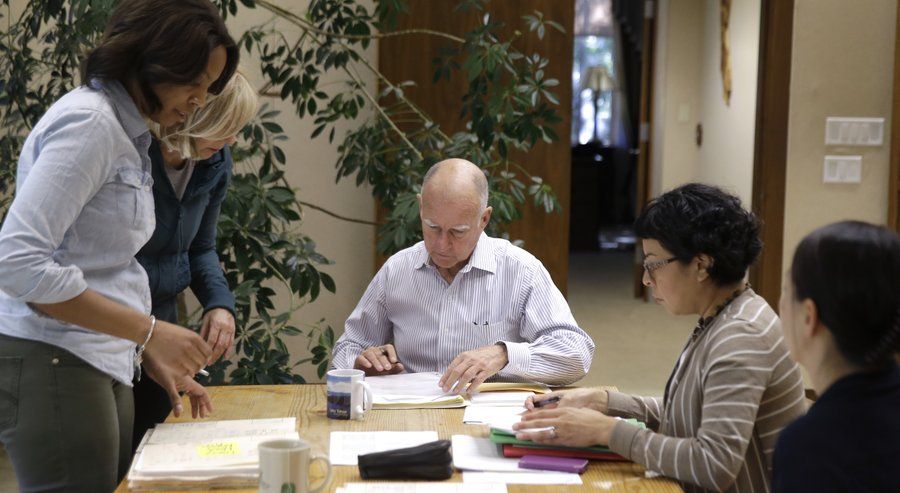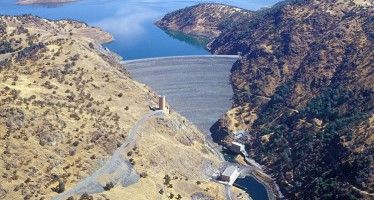Gov. Jerry Brown signs host of significant legislation
 SACRAMENTO – The 2016 legislative season is officially over, with Gov. Jerry Brown having signed 900 bills while vetoing 159 by Friday’s deadline. Some of the recently signed bills are far-reaching and will have a noticeable effect on Californians’ lives. Here’s a small sampling of some of the measures that will soon be law.
SACRAMENTO – The 2016 legislative season is officially over, with Gov. Jerry Brown having signed 900 bills while vetoing 159 by Friday’s deadline. Some of the recently signed bills are far-reaching and will have a noticeable effect on Californians’ lives. Here’s a small sampling of some of the measures that will soon be law.
A new government-run retirement program: On Thursday, Gov. Brown signed Senate Bill 1234, which gives legislative approval to the state’s continuing efforts to create a new government-run retirement program for private-sector employees. Once it is up and running, private employers (with five or more employees) will be required to offer this program, whereby 3 percent of each employees’ earnings will be deducted and invested by a state-selected investment group – possibly, the California Public Employees’ Retirement System (CalPERS).
Employees can opt out. The details are not yet certain, but the goal is to invest the money in a low-risk investment tied to the Treasury bond. Supporters say the law protects taxpayers from incurring more than minimal costs, but critics insist the program could grow and change in ensuing years – and that there’s no way of creating a massive new government program without imposing risks on the state budget.
The idea, which is being pitched in other states too, grew out of union activism. Several years ago, when publicity over unfunded public-pension liabilities began creating pressure for pension reform, union allies wanted to come up with a “positive” rebuttal to all those news stories about six-figure pensions and pension-spiking gimmicks. This idea is designed help private workers.
Putting limits on ‘policing for profit’: One of the most controversial policing strategies in recent years has been “civil asset forfeiture.” Born out of the nation’s drug war in the 1980s, forfeiture was designed to help police agencies crack down on drug kingpins by allowing departments to grab the cash, cars and properties gained through their illegal activities. But like many government programs, asset forfeiture morphed into something its creators never envisioned.
Two of the men who helped create the program in the U.S. Department of Justice, John Yoder and Brad Cates, wrote an op-ed in The Washington Post in 2014 pointing to the corruption engendered by this process: “Law enforcement agents and prosecutors began using seized cash and property to fund their operations, supplanting general tax revenue, and this led to the most extreme abuses: law enforcement efforts based upon what cash and property they could seize to fund themselves, rather than on an even-handed effort to enforce the law.”
Basically, police agencies came to depend on the revenue and they distorted their law-enforcement priorities based on the chance to grab more cash. There’s no due process here, given that police agencies file suit against the property itself, alleging it was involved in a drug crime. No conviction is necessary. California had previously passed reforms that mostly required a conviction, but police agencies got around that by partnering with the feds (and operating under looser federal standards) and then splitting the seized property.
Senate Bill 443 was killed last year after lobbying efforts by police chiefs and other law-enforcement agencies. But a fairly recent amendment – allowing cops to still take large amounts of cash without a conviction, but limiting smaller amounts of cash and property takings – eliminated most opposition from law enforcement. The new law is meaningful, and one of the more substantive compromises to take place in Sacramento this year.
Giving the terminally ill the right to try: One of the more significant “freedom” battles this year was over the so-called “right to try” – i.e., the ability of terminally ill patients to try experimental drug treatments that have yet to gain final approval from the Food and Drug Administration. Similar measures have been approved by 31 other states.
The Goldwater Institute, a Phoenix-based free-market think tank, has been championing these measures across the country. As Goldwater explains: “The FDA … often stands between the patients and the treatments that may alleviate their symptoms or provide a cure. To access these treatments, patients must either go through a lengthy FDA exemption process or wait for the treatments to receive FDA approval, which can take a decade or more and cost hundreds of millions of dollars.”
The California law, Assembly Bill 1668, passed overwhelmingly. According to the official bill analysis, it authorizes drug manufacturers to make investigational treatment available “to a patient with a serious or immediately life-threatening disease, when that patient has considered all other treatment options currently approved by the FDA, has been unable to participate in a relevant clinical trial, and for whom the investigational drug has been recommended by the patient’s primary physician and a consulting physician.”
Allowing felons to vote: One of the more controversial new laws, Assembly Bill 2466 by Assemblywoman Shirley Weber, D-San Diego, allows felons who are serving their sentence in county jails to vote. The measure was opposed by law-enforcement groups, but Weber argued it would stop discrimination in voting and make it less likely that prisoners would commit new offenses.
“Civic participation can be a critical component of re-entry and has been linked to reduced recidivism,” Weber said, according to a Los Angeles Times report. “For me, this bill is not about second chances, but about maintaining the integrity of elections,” said Sen. Pat Bates, R-Laguna Niguel, in a statement. “Close elections, especially at the local level, could now turn on a handful of ballots cast by people in jail. This new law is bad for democracy and will further erode trust in government.”
Putting self-driving cars on the road: Autonomous vehicle technology has been advancing rapidly, and California is, not surprisingly, ground zero for the development of this important new technology. Gov. Brown signed a bill Thursday “that for the first time allows testing on public roads of self-driving vehicles with no steering wheels, brake pedals or accelerators,” according to a San Jose Mercury News article. “A human driver as backup is not required, but the vehicles will be limited to speeds of less than 35 mph.”
Assembly Bill 1592 itself is rather modest. It provides two spots for such testing – in a San Ramon business park and at the former Concord Naval Weapons Station. And Friday, the California Department of Motor Vehicles released new regulations that are far friendlier toward self-driving cars than the DMV’s previous regulations. So while the new law itself isn’t particularly significant, the state’s new legislative and regulatory approach certainly is. If that approach continues, we’ll be seeing rapid expansion of autonomous vehicles here.
Greenlighting granny flats: The governor’s signing of Senate Bill 1069 shows increasing bipartisan understanding of the state’s skyrocketing home prices. The bill would relax standards for creating ADUs (accessory dwelling units), better known as granny flats.
“Eliminating barriers to ADU construction is a common-sense, cost-effective approach that will permit homeowners to share empty rooms in their homes and property, add incomes to meet family budgets, and make good use of the property in the Bay Area and across California while easing the housing crisis,” according to the bill analysis’ summary of the author’s arguments. The bill embraces a regulatory approach that could be tried with other types of housing.
Steven Greenhut is Western region director for the R Street Institute. He is based in Sacramento. Write to him at [email protected].
Steven Greenhut
Steven Greenhut is CalWatchdog’s contributing editor. Greenhut was deputy editor and columnist for The Orange County Register for 11 years. He is author of the new book, “Plunder! How Public Employee Unions are Raiding Treasuries, Controlling Our Lives and Bankrupting the Nation.”
Related Articles
One year later, glitches still plague Covered CA
“Here we go again with the same nightmare as a year ago. [I’m] truly fed up with Covered California’s
Assemblyman Rendon’s bill addresses CA drought
As the record drought intensifies, the California Legislature is working on several proposals to address the state’s lack of water
CA could suspend high-school exit exam
State Sen. Carol Liu, D-Pasadena, has introduced Senate Bill 172, which “would remove the high school exit examination as a condition




